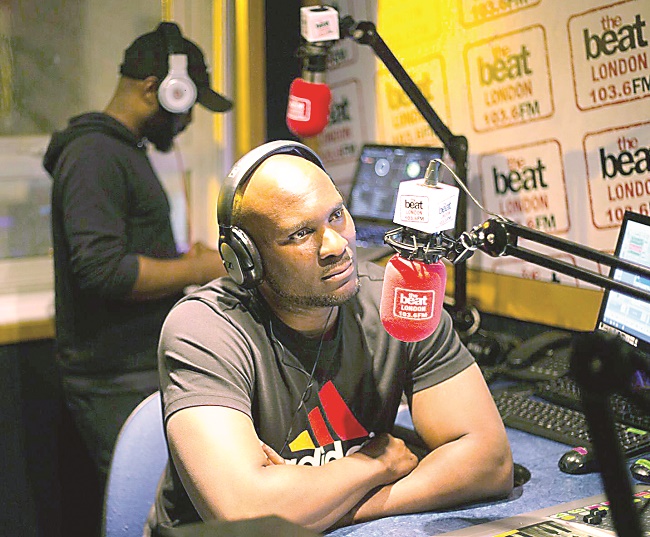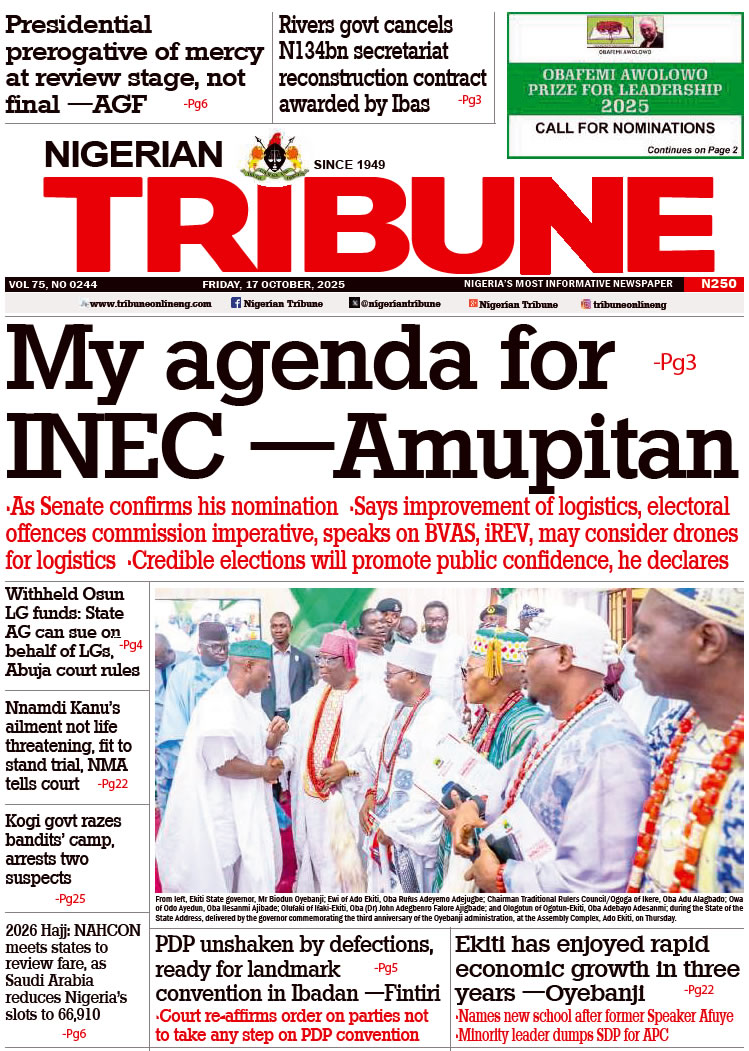Adesope Olajide is a UK broadcaster, co-host of Afronation, an ardent African culturist and Afrobeat podcaster. In this exclusive interview with WALE OLAPADE, he opens up on the need to leverage of the creative and entertainment sector to boost the Nigeria brand economy, support creative talents to grow and
other sundry issues.
What does Afrobeats mean to you?
Afrobeats is the new term being used to describe Nigerian and Ghanaian pop music. It’s a word that was formed in the UK over a decade ago when people try to request for Nigerian or Ghanaian pop music. It’s nothing to do with the original genre Afrobeat which the great Fela Kuti created, however most of the young stars have indeed been inspired by Fela’s authentic African sounds, instrumentation and lyrics in some cases.
Is the Nigerian creative industry as well as Afrobeats brand getting more prominence across the globe?
The success of some of the young stars such as Wizkid, Davido, Yemi Alade, Tiwa Savage, to name a few, has elevated Nigerian creative talents on the global stage highlighting the country as a hub of incredible entertainers and talented creatives who have stood shoulder to shoulder with the likes of Beyonce and Drake. These young musicians and their music have gone on to become unofficial ambassadors for Nigeria and its tourism industry over the last five years. Lagos became the holiday destination in Africa during Christmas due to the number of headline concerts and events spearheaded by some of Nigeria’s big names. The success of the music in diaspora served as a call for Nigerians, Africans and others abroad to come home and attend some of these festivities and in some cases, they serve as the reason for diasporans to return to the motherland for the first time. Due to the number of Nigerians in diaspora, Nigerian instantly shot to the number one spot for holiday makers to Africa in December and it is without doubt because of the rising popularity of its music scene and superstars touring the globe.
What inspired your love for indigenous music and why have you immersed yourself in it promotion?
My love for Afrobeats came purely from the search of something that reflects my identity, my background and my culture. I moved to the UK at a time when it wasn’t cool to be African and all the derogatory jokes were made at Africans during those times. However, I joined a private radio station based in Peckham (where a large number of Nigerians live in) and my mission was to play Nigerian music. Due to the reception the radio show got from listeners, it gave me more confidence of being on the right track and the love for Afrobeats and African pop culture grew from there.
In your little way, how have you been able to give Afrobeats a boost in the international scene?
I have been promoting African pop music and culture since 2004 and this has taken me to parts of West Africa, East Africa and trips to Southern African is currently scheduled. In addition to that, I have travelled across Europe from Germany to Holland, France to Ireland promoting African pop culture.
What is it like promoting African music fusion in the UK compared to the showcase you do in African countries?
In the UK, promoting African pop culture was slightly different because the audience had to be carried along and the music needed to be introduced so we were doing two roles in one. which is introduction and promotion. So, it took a while for us to get the large audiences such as the 20,000 (Twenty thousand) capacity where Wizkid and Davido made headlines simultaneously. However, in Africa, the energy is different because the audiences are aware of the music and are looking for other forms of entertainment to add to their knowledge of the music and love for their stars. The UK has become the centre for Afrobeats worldwide with a strong fan base for the artistes centred in London where there is a huge number of second and third generation of Nigerians and Africans. There is also a renewed level of pride in their roots which has come from the music, movies, fashion and food with jollof rice becoming a fan favourite too.
What is your Nigerian story, in terms of your calling as an Afrobeats promoter?
I’m a radio and TV broadcaster who promotes Afrobeats on both platforms in the UK and around the world. Being called a promoter is really a reference to my role and position on platforms telling the world about our music and our entertainers. Also I am ensuring that they are seen in the same light that pop stars around the world are seen.
What is the journey so far, you open up on the thin and fat of the African music culture and promotion?
The journey, so far, began with the success of Congolese music with stars like Awilo Logonba and Kofi Olomide to the Nigerian takeover with stars like 2face Idibia, Remedies, Psquare, Olu Maintain, Dbanj and the Mohits and then the new generation with the start of Wizkid. When talking about the journey so far especially in the UK, we have also had great impacts with Ghanaian music and stars who also pushed the scene with their flavour of the music and entertainment. Since the inception of the younger generation with Wizkid in 2010/2011, the growth has been phenomenal as international collaborations have increased ultimately ending with Beyonces lion king the gift album which features some of Nigeria’s great young stars such as Wizkid, Tiwa Savage, Yemi Alade, Mr Eazi and Tekno. That platform also announced Nigerian pop stars and music on the global stage and is currently followed up by Burnaboy’s two time Grammy nomination.
What’s about the Afrobeats podcast?
The Afrobeats podcast is a video and audio platform I created to interview celebrities and discuss the hot topics within the scene and run commentary on new content as well as introduce audiences to our stars. It’s also a way of glamourising our culture. So, it’s on par with hip hop and pop culture simultaneously. It’s on TV in Europe via Yanga TV and it’s on YouTube and all other audio digital platforms too.
What does Afrobeats mean to you?
Afrobeats to me is a culture, it is African pop culture which includes pop music, dance, fashion and food. It’s the umbrella that introduces outsiders to the beauty of African creatives.
Are we as Africans done justice to the preservation and promotion of Afrobeats?
In terms of doing Afrobeat promotion justice, I believe we have done Fela proud as we have kept his legacy alive though the new sub-genre Afrobeats largely has nothing to do with the original Afrobeat. The success of the young stars within Afrobeats and their respect for Fela continue to promote his art, the original genre and the music to the world. We can always do better and that’s what the likes of the Afrobeats podcast is set out to do, to celebrate our culture the way others will not.
How can African governments leverage on the global music scene?
I feel the government should look at this music genre and its stars as a vehicle to promote Africa and in this case Nigeria to boost the economy and create jobs. Individual governments should invest in this sector by making it easier for creatives to do their jobs and be creative. They should grant incentives allowing young people to build careers within this sector and partner with the big faces of the culture officially as tourism ambassadors, opening the floodgates to visitors who in turn bring direct revenue to the countries. That’s what the UK and America did by investing in pop and hip-hop musicians and supporting them to create and promote their content whilst serving as ambassadors.
On the 2021 international women’s day celebration, you took up on some topnotch music artistes, who are they and how have they contributed to the Afro-fusion?
On International women’s day, I spoke to Efya from Ghana, Busiswaah from South Africa and Niniola from Nigeria via Instagram life to discuss women’s rights on the continent and how we can contribute to making live better for women in general. These three women have become global icons through their music as Efya is one of the most incredible singers in Ghana with a decade long career, Niniola having one of the biggest pop songs years ago in Maradona and Busiswaah one of the biggest South African stars who teamed up with Beyoncé on her last project. Their varying sounds have gone on to unite different music lovers across African and the world as they serve as individual ambassadors to their countries and inspiration to the younger generation coming behind them.
Is our music culture leaving up to expectation?
Africans need to support the culture, the music and most importantly the creative talents by buying their products and streaming their music, making it easier for acts to survive on their careers and make better content. On the other hand, the governments must see this as another oil or diamond boom as direct investments into this sector will create jobs, increase revenue and slowly free us from the shackles of borrowing. China saw an opportunity in industrialisation and invested hugely in that making China a global force today whilst America saw the creative arts in film and music as a way to sell America to the world and they did the same. It’s time for Africa to follow in the footsteps of the world giants too.
The COVID-19 has made the past two year or so a very traumatic one for everyone and especially the entertainment world; in your assessment was it a totally bad period or a blessing in disguise following the innovative out turn of the new normal?
COVID-19 without doubt crippled the industry as it relied on people meeting up and attending events so that stopped however it also opened the door to other creative means of getting to the audience such as virtual concerts, virtual recording sessions and rise in digital marketing. Even as things open up, some parts of the COVID-19 era will remain such as virtual concerns and digital marketing as people have become comfortable with enjoying things in the comfort of their own home now and willing to pay for it. So Davido can perform in Lagos but still earn revenue from us here in the UK as we will be paying for online viewing.
What do you think that we can do to make Afrobeat not only an image booster for Africa, but also an economic factor that the creative sector to leverage on?
The variety of Afrobeats concerts I believe started due to the demand of the audience here to see the stars live. As the songs grew in parties, radio stations and TV stations, it led to fans asking to see the acts on stage. Promoters have always initially been led to concerts due to the financial incentives it may bring but when it comes to Afrobeats and African concerts a large number or organisers invested in this area due to the love for the music and wanting to be part of something that celebrated our heritage. Since the initial successes in the 90s with Nigerian and Ghanaian independence celebrations in the UK where acts were booked to perform at, then came headline concerts as audiences interest grew. This ultimately became a thriving business with popular event organisers like Blacknights, Cokobar, West Coast and now smade events simultaneously organising headline concerts back to back. African concerts has now become a triple edged sword as they serve as a platform for the stars to perform to their fans in the UK, a platform to promote African music/dance to new audiences and ultimately a money making event for concert organisers and their staff. Ultimately, creating an industry runing mainly by young Africans benefitting from their culture in the diaspora.
Apart from your broadcast obligation, what else do you do or have your been doing?
In addition to my broadcast duties, I am also an event and concert host/mc and I have had the pleasure of hosting concerts for most of the Afrobeats stars in the UK such as Burnaboy, Yemi Alade, Tiwa Savage, Adekunle Gold, king promise, Dbanj and lots more. Afronation is currently the largest music festival for Africans worldwide and it started in Portugal bringing together some of the most successful stars from the continent and entertainers in Europe, America and the west indies ultimately celebrating black music put together by Smade events, echo talent and live nation. I have been blessed to have been a co-host for Afronation in Portugal and then Ghana where we ensure the festival attendees are having a great time in between performances by the stars. It’s the most incredible festival celebration afrobeats music, African pop culture and black music as a whole. Afronation in such a short time as become a mainstay in festivals around the world and the go to festival for African pop acts as well as musicians targeting this large fan base and the organisers should be applauded for putting it together especially in various countries which include Puetorico and Mexico before COVID-19 hit.
YOU SHOULD NOT MISS THESE HEADLINES FROM NIGERIAN TRIBUNE
We Have Not Had Water Supply In Months ― Abeokuta Residents
In spite of the huge investment in the water sector by the government and international organisations, water scarcity has grown to become a perennial nightmare for residents of Abeokuta, the Ogun State capital. This report x-rays the lives and experiences of residents in getting clean, potable and affordable water amidst the surge of COVID-19 cases in the state…
Selfies, video calls and Chinese documentaries: The things you’ll meet onboard Lagos-Ibadan train
The Lagos-Ibadan railway was inaugurated recently for a full paid operation by the Nigerian Railway Corporation after about a year of free test-run. Our reporter joined the train to and fro Lagos from Ibadan and tells his experience in this report…Afrobeat has encouraged Africans
WATCH TOP VIDEOS FROM NIGERIAN TRIBUNE TV
- Relationship Hangout: Public vs Private Proposals – Which Truly Wins in Love?
- “No” Is a Complete Sentence: Why You Should Stop Feeling Guilty
- Relationship Hangout: Friendship Talk 2025 – How to Be a Good Friend & Big Questions on Friendship
- Police Overpower Armed Robbers in Ibadan After Fierce Struggle






